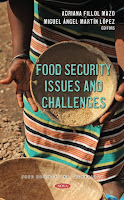La editorial Nova Science Publishers ha publicado recientemente la obra colectiva "Food Security Issues and Challenges", de la que son editores Adriana Fillol Mazo y Miguel Ángel Martín López.
It is clear that one of the most damaging global problems is hunger. There is still a high proportion of hungry people in the world, the number of human beings in this condition exceeding 690 million, according to the latest State of Food Security and Nutrition in the World Report (FAO 2020). Consequently, its eradication is extremely urgent. Nevertheless, it does not appear that Sustainable Development Goal number two, i.e. Zero Hunger, will be achieved by 2030. The United Nations itself admits this, stating that “the world is not on track to achieve Zero Hunger by 2030. If recent trends continue, the number of people affected by hunger would surpass 840 million by 2030”.
The problems facing food in the world today have increased considerably, as well as various factors and phenomena that augment the complexity of the issues or situations that fall within the scope of food security, such as: climate change, land grabbing, use of chemical fertilizers, loss of agrodiversity and other agricultural sustainability issues, obesity problems resulting from unhealthy diets, the impact of the coronavirus pandemic, the lack of justiciability of the right to food, the use of biotechnology in food, etc.
In short, this book is a diverse compilation of the new manifestations of global food security seen from several angles and areas. The book aims to let visualize the main global problems and challenges that have a negative impact on food security, with the underlying objective of highlighting the need for reinforcing its full application in all contexts and countries. To this end, we believe that it is necessary to make its concept operational, and take it into consideration when applying policies and standards, especially in those areas and matters that may undermine said food security. In this sense, it is essential to strengthen its legal protection through a coherent and operational interpretation of the human right to food, so as to broaden its content and make it consistent with its pillars and foundations.
Extracto del índice la obra:
- Chapter 1. Broadening the Protection of Food Security and the Right to Food Through the Inclusion of Health and Sustainability Issues (Miguel Ángel Martín López – Department of International Public Law and International Relations, University of Sevilla (US), Spain)Ficha:
- Chapter 2. Food Security and the WTO (Leonardo Fabio Pastorino – Faculty of Law and Social Sciences, Universidad Nacional de La Plata, Argentina)
- Chapter 3. The Right to Food and the Expanding Frontier of Access to Justice (Manuel A. Gómez – Florida International University College of Law, Miami, Florida)
- Chapter 4. Health: Respect for Life and the Food Chain (Claudia Petry – University of Passo Fundo (UPF), Passo Fundo, Rio Grande do Sul (RS), Brazil)
- Chapter 5. Junaeb’s School Feeding Program in Chile; Innovations for Threats to Food Security (Angélica Fellenberg and Nicolas Cobo – School of Agricultural and Forestry Pontifical Catholic University Santiago, Chile)
- Chapter 6. More Food is Not the Answer: Using Systems Thinking to Build Sustainable Food Systems for Seniors (Denise C. Tahara – Department of Public Health, School of Health Sciences and Practice, New York Medical College, Valhalla, New York)
- Chapter 7. Food Insecurity and Rural Poverty in Mexico: The Case of Corn Consumption (Marco Antonio Pérez Méndez and Gilberto Aboites Manrique – Department of Economics, Universidad Autónoma Metropolitana, Mexico City, et al.)
- Chapter 8. Agroecology and the Human Rights-Based Approach: Transforming Food and Agricultural Systems to Improve Small Farmers’ Livelihoods (Raquel Villodres Toledo – Human Rights Studies alumni, Columbia University, NY, US)
- Chapter 9. Food Systems for the Right to Food Fulfillment in Paraguay: An Agroecology Contribution (Federico Vargas Lehner and Mónica Gavilán Jimenez – Faculty of Agricultural Sciences, National University of Asunción, San Lorenzo, Paraguay)
- Chapter 10. Food Security and Agrochemicals: Rise and Fall of Glyphosate as Holy Grail of Agriculture Production in the European Union (Justo Corti Varela – Public International Law Department, UNED, Madrid, Spain)
- Chapter 11. Investment Law in the Face of Food Security Challenges in West Africa (François Collart Dutilleul and Alhousseini Diabate – Founding Member of the Research Centre Lascaux on Transitions (CELT), France, et al.)
- Chapter 12. The Impact on Human Rights and Food Security of Land Grabs: Cases from Brazil and Ecuador (Francisco Javier Zamora Cabot, José Elías Esteve Moltó, and Maria Chiara Marullo – Department of Private Law, Universitat Jaume I, Castelló, Spain, et al.)
- Chapter 13. Ocean Acidification as a Risk to Food Derived from the Marine Ecosystem: In Search of International Legal Responses (Adriana Fillol-Mazo – Lecturer in International Public Law and International Relations, University of Seville, Seville, Spain)
- Chapter 14. Food, Capitalism and Internet of Things
(Rafael Rodríguez Prieto – Public Law, Pablo de Olavide University, Seville, Spain)
- Chapter 15. The Use of Biotechnology in Food: Challenges, Problems and New Perspectives
(Borja Montes Toscano – NATO ACO Office of Legal Affairs (SHAPE))
- Chapter 16. The Impact of COVID-19 on the Right to Food in Latin America: Insights from Uruguay (Alejandra Girona, Gabriela Fajardo and Gastón Ares – Observatorio del Derecho a la Alimentación, Escuela de Nutrición, Universidad de la República, Montevideo, Uruguay, et al.)
A. Fillol Mazo, M.A. Martín López (Eds.)
"Food Security Issues and Challenges"
Nova Science Publishers - Series: Food Science and Technology
393 Pages - $230.00
ISBN: 978-1-68507-095-3

No hay comentarios:
Publicar un comentario
Los comentarios son responsabilidad exclusiva de su autor. Se reserva el derecho de eliminar cualquier comentario contrario a las leyes o a las normas mínima de convivencia y buena educación.